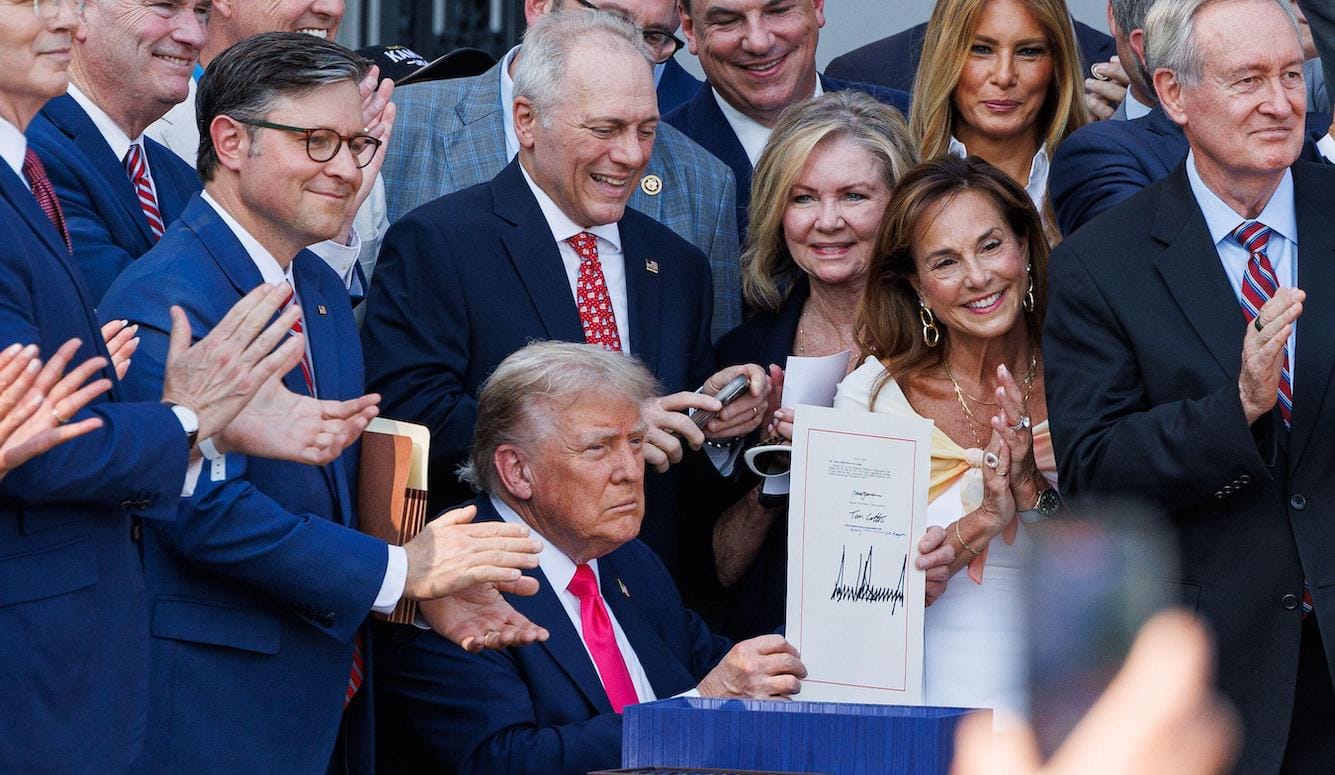Identity
Christopher Hitchens, Anti-Identitarian
Hitchens didn’t just see how identity politics could warp a person’s ideas and principles—he understood that it could replace them altogether.

The Hitchens Prize is an annual award sponsored by the Dennis & Victoria Ross Foundation, named for the late polemicist and essayist Christopher Hitchens and presented to “an author or journalist whose work reflects a commitment to free expression and inquiry.” George Packer was this year’s recipient, and his acceptance speech examined a strange pathology of our time: “Writers are now expected to identify with a community and to write as its representatives.” While the community “might be a political faction, an ethnicity or a sexuality, a literary clique,” the effect is always the same: to enforce certain dogmas; to loudly declare your virtuous affiliations; to suppress independent thought.
Hitchens, like Packer, was a great admirer of George Orwell (the former wrote a book in 2002 called Why Orwell Matters, while the latter edited two volumes of Orwell essays). In his 1946 essay “The Prevention of Literature,” Orwell observed: “To write in plain, vigorous language one has to think fearlessly, and if one thinks fearlessly one cannot be politically orthodox.”
Hitchens thought fearlessly. As Martin Amis put it, he liked “the battle, the argument, the smell of cordite.” This is why he told the publisher of God is Not Great: How Religion Poisons Everything to organize a book tour that ran through the pulpits of the American South instead of remaining confined to the coasts. It’s why he relished every opportunity to lambaste Bill and Hillary Clinton in front of liberal audiences. It’s why he went after Mother Teresa and Princess Diana. He was an inveterate iconoclast—if there was a bloated reputation to puncture or a cherished dogma to deflate, he saw it as a duty and a pleasure to do so.
It’s no surprise that this oppositional inclination, coupled with blistering rhetorical ability, made Hitchens a deadly debater. After his death in December 2011, countless tributes and articles about Hitchens emphasized what a force he was in the studio and on the debate stage—his erudition and wit, his fluency, his seemingly superhuman memory. Hitchens is unforgettable for all these reasons, but people don’t miss him because he could turn a phrase or win an argument on CNN—they miss him because he thought for himself and refused to apologize for it. He didn’t want to write and speak as the representative of a community: “My own opinion is enough for me,” he told the audience at a debate on free speech in 2007, “and I claim the right to have it defended against any consensus, any majority.”
“Unpopular ideas can be silenced, and inconvenient facts kept dark, without the need for any official ban,” Orwell wrote in his original introduction to Animal Farm (which was, ironically, suppressed). He continued: “Anyone who challenges the prevailing orthodoxy finds himself silenced with surprising effectiveness.” While there was far more official censorship in Orwell’s time, we’re living through an era of pervasive self-censorship, and as Packer explains, this type of silencing is “more insidious than the state-imposed kind, because it’s a surer way of killing the impulse to think, which requires an unfettered mind.”
We live in an age of ascendant orthodoxy—a phenomenon that has naturally followed from an explosion of tribalism and polarization over the past several years. Our civil society is becoming increasingly fractured along identitarian lines—another sure way of killing the impulse to think. It’s now quite normal for pundits and politicians to argue that race and gender are qualifying and disqualifying credentials for election to the highest offices in the country. Meanwhile, the president openly declares that people from “shithole countries” don’t have any business becoming Americans—the same president who spent years wondering aloud if Barack Obama was a citizen of the United States and suggesting that he might have to be thrown out of office.
Hitchens detested tribal and parochial feelings of any kind, which is why he was dismayed when he witnessed the emergence of identity as a catalyst for political mobilization in the late 1960s and early 1970s. In his memoir, Hitch-22, Hitchens attacked radicals who thought it was “enough to be a member of a sex or gender, or epidermal subdivision, or even erotic ‘preference,’ to qualify as a revolutionary.” When Hitchens first heard the expression “the personal is political,” he knew “as one does from the utterance of any sinister bullshit that it was—cliché is arguably forgivable here—very bad news.” As he put it in a 2008 article:
People who think with their epidermis or their genitalia or their clan are the problem to begin with. One does not banish this specter by invoking it. If I would not vote against someone on the grounds of ‘race’ or ‘gender’ alone, then by the exact same token I would not cast a vote in his or her favor for the identical reason.
It’s easy to imagine what Hitchens would have thought about a recent New York Times headline that declared “The Next President Should Not Be a Man” or a prominent writer and activist who announced that she “will not support white male candidates in the Dem primary.” The people who write such things are thinking with their epidermis and genitalia, which is to say they’re not thinking at all. You don’t have to bother defending candidates’ principles and positions when gender and race are the only relevant variables.
In The Coddling of the American Mind, Jonathan Haidt and Greg Lukianoff make a distinction between “common humanity” and “common enemy” identity politics. Hitchens embraced the former (though he would have argued that the word “identity” wasn’t necessary). For example, he regarded Bayard Rustin, one of the lead organizers of the March on Washington, as “perhaps the true genius of the civil rights and democratic socialist movements.” Unlike “black power” activists such as Stokely Carmichael and Malcolm X, Rustin saw civil rights through the prism of universal humanism instead of racial identity. He wanted to transcend the very idea of race as a relevant social and political category, and he didn’t see how this was possible if we remained transfixed by it.
Even forceful anti-identitarianism can coincide with an acknowledgment that certain groups face unique threats and challenges. Hitchens’ hostility to identity politics didn’t make him blind to racial injustice in the United States and around the world, nor did it make him any less radical in his agitation for civil rights and racial equality. He was once arrested while protesting the British government’s support for the apartheid regime in South Africa and as a young radical he regularly took part in sit-ins and other civil rights demonstrations. Later in his life, he even argued in favor of reparations for the African American descendants of slaves.
But like Rustin, Hitchens thought the clearest gauge of racial equality was the extent to which American society could move past racial divisions altogether (Rustin actually opposed reparations and Affirmative Action for this reason). As his political history demonstrates, this didn’t mean ignoring the grave injustices and inequities black Americans continue to face. Nor did it mean forgetting about the legacies of slavery and segregation. It meant abandoning racial identity as an engine of political mobilization and treating people as individuals instead of representatives of a group. This is why Hitchens advocated the common humanity arguments for civil rights advanced by Rustin and Martin Luther King Jr.: “Surely the essential and unarguable core of King’s campaign,” Hitchens wrote, “was the insistence that pigmentation was a false measure … and an inheritance from a time of great ignorance and stupidity and cruelty.”
For someone who described politics as “division by definition” and made a career out of making enemies, Hitchens’ most fundamental political principles were based upon what binds human beings together. He didn’t just loathe people who “think with their epidermis or their genitalia or their clan”—he loathed any crude nationalist claims about who belongs in a country and who doesn’t. In fact, he distrusted nationalism altogether.
“In America,” Hitchens wrote in 2005, “your internationalism can and should be your patriotism.” His attitude toward identity politics wasn’t just a rebuke of the left-wingers obsessed with race, gender, and sexuality—it was a rebuke of the “common enemy” brand of nationalism now peddled by Trump and his surrogates. Hitchens would have hated everything “America First” represents. Beyond the grotesque spectacle of an American president appropriating a slogan used by fascist sympathizers during World War II, Trump has weaponized xenophobia at every available opportunity.
Trump demanded a “complete and total shutdown of Muslims entering the United States” after the San Bernardino terrorist attack in 2015. He also called for a “registry” of American Muslims and the surveillance of mosques. Before the 2018 midterms, he incessantly described a caravan of migrants as an “invasion” and claimed (without a shred of evidence) that “criminals and unknown Middle Easterners” were on their way to the southern border. Between January and August 2019, his campaign ran more than 2,000 Facebook ads that used the word “invasion.” And this has been a consistent theme from the beginning: Trump’s first ad in 2016 announced his proposed Muslim ban and promised to build a wall on the United States’ southern border.
This is the most corrosive form of identity politics—it presents a narrow and insular idea of American identity and tells a dark story about all the ways in which that identity is in danger of being defiled by outsiders.
Near the end of Hitchens’ life, he could already see the early stirrings of Trumpism. In one particularly prescient article, he lamented the fact that “it is increasingly common to hear allegations that Obama is either foreign-born or a Muslim. And these insinuations are perfectly emblematic of the two main fears of the old majority: that it will be submerged by an influx from beyond the borders and that it will be challenged in its traditional ways and faiths by an alien and largely Third World religion.” Little did Hitchens know that the most notorious exponent of the “birther” theory would, in a few short years, occupy the Oval Office. He continued:
More recently, almost every European country has seen the emergence of populist parties that call upon nativism and give vent to the idea that the majority population now feels itself unwelcome in its own country. The ugliness of Islamic fundamentalism in particular has given energy and direction to such movements. It will be astonishing if the United States is not faced, in the very near future, with a similar phenomenon.
Perhaps more astonishing was the rapidity with which the phenomenon of populist nativism rushed to the surface in the United States. Hitchens’ warning was eerily prophetic: He recognized the connection between populist movements on both sides of the Atlantic. He identified the latent but widespread fear that the United States would be “submerged by an influx from beyond the borders”—he could just as easily have used the word “invasion.” He understood how the “ugliness of Islamic fundamentalism” could be exploited. Trump saw a spike in support after he used the San Bernardino tragedy to stoke nativist fear and resentment, a fact he even publicly celebrated.
Competing forms of identity politics nourish and sustain one another. When Trump presents an essentialized version of American identity that expresses clear hostility toward certain groups of Americans, those groups’ identitarian demands become even stronger as they rally around a common enemy. Meanwhile, when left-wing writers, activists, and politicians argue that some candidates are too white, male, etc. to deserve support or that the United States should stop securing its borders altogether, Trump can appeal to the most paranoid and aggrieved impulses of Americans who already feel like they’re under threat.
Identity politics is a powerful tool for demagogues on the Left and the Right because, as Hitchens put it in a 2008 article, it acts as a “fetter upon free thought.” It coaxes people into seeing themselves as representatives of a group rather than individuals, and it punishes them for deviating from the group’s orthodoxies. In Letters to a Young Contrarian, Hitchens explains what this looks like in practice: “People began to stand up at meetings and orate about how they felt, not about what or how they thought, and about who they were rather than what (if anything) they had done or stood for.” Hitchens didn’t just see how identity politics could warp a person’s ideas and principles—he understood that it could replace them altogether.





